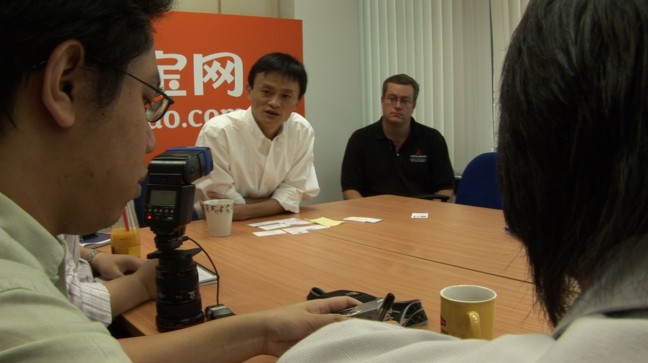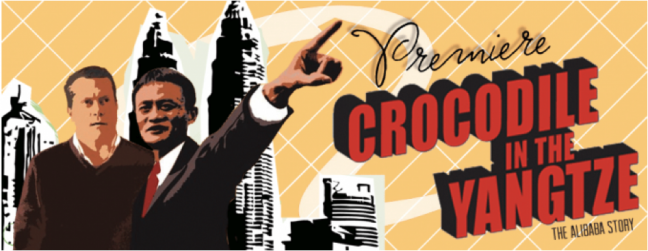Q&A with Porter Erisman, Director of CROCODILE IN THE YANGTZE: THE ALIBABA STORY (Closing Night Feature of CAAMFest San Jose)
By Jing Cao
The Center for Asian American Media (CAAM) and Taluswood Films are proud to present the San Jose Premiere of CROCODILE IN THE YANGTZE: THE ALIBABA STORY on Sunday August 18 at 7:00 PM at Camera 3 Cinema as the Closing Night Feature of CAAMFest San Jose 2013. (Get tickets!)
The award-winning independent documentary follows former English teacher Jack Ma as he grows Alibaba from a small apartment into China’s first global Internet company, battling-and beating-eBay in China along the way. The screening marks the first time for the film to appear in San Jose, home town of local e-commerce giant eBay.

The film is directed by Canadian Porter Erisman. From 2000-2008, Porter worked as a Vice-President at Alibaba Group, at various times overseeing the company’s international marketing, website operations and corporate affairs. Porter earned an MBA from the Kellogg Graduate School of Management and a BA from Stanford University. Crocodile in the Yangtze is Porter’s first film.
CAAM staffer Jing Cao chatted with Porter about the making of the film:
You were one of the first employees at Alibaba–what drew you to the organization?
When I first heard about Alibaba, I was working in Beijing at an advertising and PR agency helping US tech companies come into the China market. When a friend told me that there was a group of Chinese entrepreneurs working in an apartment with the goal of building China’s first global Internet company, I became intrigued. I flew to Shanghai to meet Jack Ma and attend an Alibaba customer event and although I wasn’t quite sure if this was a team that was ultimately going to be able to challenge the US Internet giants, I found the team’s enthusiasm inspiring – and I thought it would be an adventure to work as a foreigner in the first Chinese Internet company to go global.
What attracted you to Jack Ma as a boss? As a documentary subject?
I had interviewed with several Internet startups in China before meeting Jack. In some cases, the management seemed too hierarchical, heavy-handed, in other cases the management seemed downright unethical. But I felt Jack had a unique perspective for someone at that time. Although he didn’t have much business experience, he had been an English teacher and had spent much of his life trying to understand and teach about foreign cultures. So I appreciated that Jack was very open to foreign cultures and we had a common outlook on what it meant to build a global team.
Having worked closely with Jack for more than eight years, I was able to see the transformation that he and the Alibaba team made as Alibaba grew from an apartment to a global company with 25,000 people. When I first met the team, they assumed that, because they had so little experience, they would have to hand over control of the company to “foreign experts” and take a step back. But over time, the team grew and developed and realized that they were indeed capable of running the company themselves and even do a better job than the so-called “Silicon Valley experts.” So it taught me a lot about human potential and how ordinary people can work together to transform themselves and achieve extraordinary things. I wanted to share what I learned with others so that they could see a path for realizing their own dreams.
What was it like to make a film about a company that you had worked for?
I had read several memoirs written by former employees of Silicon Valley internet startups and found them fascinating. My own project started out as a book idea, but when I looked at the amount of footage of Alibaba’s events that had been recorded over the years by over 35 different sources, I decided I could tell the story more powerfully as a documentary film.
Interestingly, my idea to make a film only came in the last month or so of my time at Alibaba. Although I edited the film to feel seamless and allow audiences to experience the story as I did, the archival footage was never shot with the intention of being included in my film. So I luckily did not have to face the awkwardness of trying to film company events while I was there.
A week before I left the company, I was given some archival materials without any preconditions. I then disappeared for three years to gather additional footage from outside sources as well as give myself some distance from the experience, so I could see it with a more objective eye. The fact that I had previously worked for the company was both an asset and a potential liability for the film. So I spent a lot of time soul-searching to reflect on and share my experience in the most authentic way possible. The end result is something that I hope is entirely unique. And whether or not audiences see the story the same way I do, I feel satisfied that I came up with a film that reflects the thoughts and emotions I experienced in an authentic way.
What lessons did you learn from making your documentary? From your experience at Alibaba?
Prior to this documentary, I had actually worked on three separate book projects of my own, but each one had petered out. I was fortunate that, in making this film, I was editing hours and hours of inspiring moments from Alibaba’s history. So the content of the footage itself helped encourage me to push forward and complete the film. In a way, a film is like a startup company and it is easy to lose momentum when you are the only one who can push yourself forward. The “never give up” spirit I witnessed at Alibaba helped motivate me to complete the film. I’m glad it did because the film has now taken me all around the world and in many ways changed my life.
How do you think China’s tech industry differs from Silicon Valley? What can each learn from the other?
I actually think that China’s tech industry is in many ways more innovative than Silicon Valley’s, even though Chinese tech leaders are often (wrongfully) labeled as copycats or somehow lacking in innovation. In my experience, tech entrepreneurs in China rely more on intuition and move more quickly than their US counterparts. They are also much more hungry because they are often coming from much more humble backgrounds and becoming an entrepreneur is a necessity rather than a luxury. So one of my main missions of the film is to put a human face on the tech industry in China and show that there is much that Silicon Valley can learn from China’s new generation of innovators.
For more, see the website: www.crocodileintheyangtze.com
Watch the San Jose premiere of “Crocodile in the Yangtze” on August 18. Get tickets!

See the trailer:




